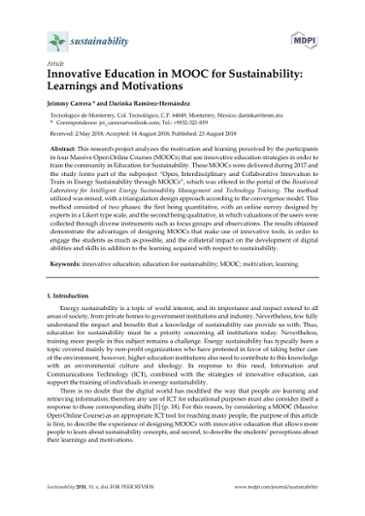| dc.contributor.author | Carrera, Jeimmy | |
| dc.contributor.author | Ramírez-Hernández, Darinka | |
| dc.date.accessioned | 2018-11-16T23:38:28Z | |
| dc.date.available | 2018-11-16T23:38:28Z | |
| dc.date.issued | 2018-08-23 | |
| dc.identifier.uri | http://hdl.handle.net/11285/631640 | |
| dc.description.abstract | This research project analyzes the motivation and learning perceived by the participants in four Massive Open Online Courses (MOOCs) that use innovative education strategies in order to train the community in Education for Sustainability. These MOOCs were delivered during 2017 and the study forms part of the subproject “Open, Interdisciplinary and Collaborative Innovation to Train in Energy Sustainability through MOOCs”, which was offered in the portal of the Binational Laboratory for Intelligent Energy Sustainability Management and Technology Training. The method utilized was mixed, with a triangulation design approach according to the convergence model. This method consisted of two phases: the first being quantitative, with an online survey designed by experts in a Likert type scale, and the second being qualitative, in which valuations of the users were collected through diverse instruments such as focus groups and observations. The results obtained demonstrate the advantages of designing MOOCs that make use of innovative tools, in order to engage the students as much as possible, and the collateral impact on the development of digital abilities and skills in addition to the learning acquired with respect to sustainability. | |
| dc.language.iso | eng | en_US |
| dc.relation | This research was funded by CONACYT-SENER grant number Call: S0019-2014-01. | en_US |
| dc.relation.ispartof | 266632-CONACYT-SENER-S0019201401 | |
| dc.rights | Atribución-CompartirIgual 3.0 Estados Unidos de América | * |
| dc.rights.uri | http://creativecommons.org/licenses/by-sa/3.0/us/ | * |
| dc.title | Innovative Education in MOOC for Sustainability: Learnings and Motivations | en_US |
| dc.type | Revista / Journal | en_US |
| dc.identifier.journal | Sustainability | en_US |
| dc.subject.keyword | innovative education | en_US |
| dc.subject.keyword | education for sustainability | en_US |
| dc.subject.keyword | MOOC | en_US |
| dc.subject.keyword | motivation | en_US |
| dc.subject.keyword | learning | en_US |
| dc.identifier.volume | 10 | en_US |
| dc.identifier.startpage | 1 | en_US |
| dc.identifier.endpage | 27 | en_US |
| dc.subject.country | Suiza / Switzerland | en_US |
| dc.relation.isPartOf | 266632-CONACYT-SENER-S0019201401 | es |
| refterms.dateFOA | 2018-11-16T23:38:28Z | |
| html.description.abstract | <html>
<head>
<title></title>
</head>
<body>
<p>This research project analyzes the motivation and learning perceived by the participants in four Massive Open Online Courses (MOOCs) that use innovative education strategies in order to train the community in Education for Sustainability. These MOOCs were delivered during 2017 and the study forms part of the subproject “Open, Interdisciplinary and Collaborative Innovation to Train in Energy Sustainability through MOOCs”, which was offered in the portal of the <i>Binational Laboratory for Intelligent Energy Sustainability Management and Technology Training</i>. The method utilized was mixed, with a triangulation design approach according to the convergence model. This method consisted of two phases: the first being quantitative, with an online survey designed by experts in a Likert type scale, and the second being qualitative, in which valuations of the users were collected through diverse instruments such as focus groups and observations. The results obtained demonstrate the advantages of designing MOOCs that make use of innovative tools, in order to engage the students as much as possible, and the collateral impact on the development of digital abilities and skills in addition to the learning acquired with respect to sustainability.</p>
</body>
</html> | en_US |

